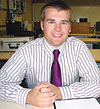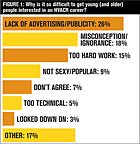
FSU student Nate Toland describes the type of HVACR career he is seeking once he graduates, confident that he can succeed in whatever he chooses.
At least that is the majority opinion of a group of 114 Ferris State University (FSU) HVACR program students who recently participated in aNEWSsurvey.

FSU student David Ausema already has a job lined up after he graduates from the HVACR program – he is heading to Texas to work for TDIndustries.
One FSU student said that HVACR is basically an invisible and thankless job. “You can do a hell of a lot of design work for someone and they don’t know who you are or what you have done for them,” he said. “It’s like being a goalie on a hockey team. If your team wins you receive little to no credit but if your team loses, all of the blame rests on you. I don’t think HVACR industry positions get a lot of recognition and when they do, it is for the wrong reasons.”
In other words - as many students said - HVACR is not sexy. But the image can change with some good, informative public relations.
THE DIFFICULTY FACTOR
One of the survey questions asked students, “Why is it so difficult to get young (and older) people interested in an HVACR career?” Some of the answers appear in Figure 1. The two most common replies were lack of advertising/publicity (26 percent) and misconception/ignorance (18 percent). The other reply receiving a double-digit share was “too hard work” at 15 percent.Some of the students blamed the lack of information available to high school students as a reason for the lack of interest in HVACR. “The HVACR trade needs to get more information out on the trade, especially in high school,” said Brian Sipper. “Many people don’t know about the trade or what it has to offer. They don’t want to be a pipefitter or plumber and they think that is what HVACR is all about.”

One student said the HVACR trade is misunderstood due to ignorance. “People just think it is all service and repair work,” he said. Another added, “No offense, but little children don’t say ‘I want to be in HVAC when I grow up.’”
Justin Baurbach acknowledged that the trade is misunderstood by people outside of it. “People don’t understand all of the different career paths that HVACR can take you on,” he said. “I think that most people think that it is simple heating and cooling and don’t understand the complexity of the HVACR trade.”
Daniel Flores said his roommates are amazed, and unaware, of the earning power of an HVACR career. “The amount of money generated in this industry, along with the chance to move up in other positions, is unlike any other industry,” he said. “My roommates are jealous at how much money I make compared to them - while having the same amount of college.”

OFFERING ENCOURAGEMENT
The next question on the survey asked students how the HVACR trade could encourage more people to enter the trade and stay in the trade. The answers, like the previous question, were predictable (see Figure 2). Publicizing career opportunities had the highest percentage of responses (19 percent), followed by good pay and benefits (14 percent), and general media advertising (12 percent).Several other responses were very similar to publicizing career opportunities, but the bottom line is this: The trade needs to do a better job of bragging about itself.
John Witte’s reply was representative of many other students - spread the word. “The trade should send people to high schools and inform the students about HVACR careers,” he said. “Let students know the options that are out there and the possible salaries available in the trade.”
Ryan Follick said the trade needs to advertise the benefits of an HVACR career “via television, billboard ads, and good quality work.”

Anthony Lund is a high school senior who recently got his first taste of mock interviews. He is considering all types of HVACR career options.
“The best thing the HVACR trade can do in order to get more people interested in this field is to talk about job security,” said Craig Kellermeier. “There is never going to be a machine that can go out in the field and work on this equipment. People will always be needed on the jobsite to physically perform the work.”
David Morrissey agreed. “The biggest draw that the industry has is that there will always be a need for HVACR,” he said. “There is no possibility of our jobs being shipped off to Mexico.”
Other suggestions included using real-life successful HVACR people to talk about the career opportunities, presenting more at job and career fairs, spreading the word at community colleges, and getting women interested in the trade. “Women should know that HVACR is not just a job, it is a secure career,” said Hing Ly.

MOST POPULAR POSITIONS
The students were also asked what position they wanted to attain in HVACR and why. The most popular replies (shown in Figure 3) were service technician (21 percent), project manager (20 percent), and engineer (16 percent).Some FSU students wanted to start in the field and work their way into management, learning all aspects of the trade. Others wanted to work in the field because they didn’t want to be “holed up in a small office space.”
One replied, “I want to be a service tech for a few years and eventually move up into project management.” Another said, “I want to start in service and installation, move into service management, and hopefully own my own business.”

FSU student Shane Sieb comes from a family-owned HVACR business that was once featured in The NEWS. He’d like to carry on the tradition.
One student said that project engineering would have a little bit of everything for him. “I would like to be able to create and design the HVAC system and take part in its progression,” he said. “A little work in the office, a little work in the field, a little bit of sales, and some travel - this is the way I would like to work and would feel the most comfortable at.”
But not everyone is sure what he or she wants to do. Ten percent of the respondents, like this student, were undecided. “I just want to experience new things and keep learning the industry,” he said.
Publication date:01/26/2009

Report Abusive Comment